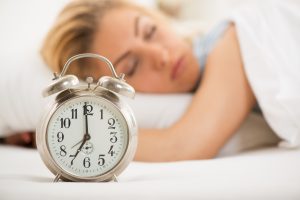
Have you ever heard of obstructive sleep apnea (OSA)? A common sleep disorder, OSA impacts millions of people in the United States. However, lack of treatment could lead to very serious complications. Fortunately, we help residents of Astoria, NY, rest easier with a custom-made oral appliance. How does a mouthguard stop sleep apnea?
The Warning Signs of OSA
How do you know if you’re at risk? There are a number of warning signs to watch for, many of which occur when you’re awake. First, many patients with the disorder report chronic snoring or waking suddenly in the night struggling to breathe or even choking. Dry mouth in the morning, frequent headaches, daytime drowsiness, and moodiness are also common indicators of trouble. If you have trouble focusing on tasks or staying awake behind the wheel, this could also be cause for concern. Don’t ignore these warning signs, please see us right away for a diagnosis.
Why Do We Develop Sleep Apnea?
A sleep apnea episode occurs when the soft tissue in the throat and mouth collapse and block airflow as we sleep. People with the disorder stop breathing until the brain takes note of a sudden drop in oxygen. The brain wakes the patient, even though he or she will likely have no memory of this. The disorder prevents people from obtaining the deep, uninterrupted sleep we need to feel rested during the day. Over time, OSA has been linked to higher risks of depression, high blood pressure, stoke, and heart attack. Fortunately, we have a comfortable and minimally-invasive solution!
Treating the Issue with an Oral Appliance
How do we help patients with the disorder? In most cases we prescribe a custom-made oral appliance. The appliance will look similar to a mouthguard or oral splint. The patient wears the device at night, allowing it to reposition the jaw and ensure open airways. Patients then enjoy a reduced risk of sleep apnea episodes and enjoy improved quality of life. We also suggest a few changes to your bedtime routine, such as avoiding alcohol, caffeine, large meals, or vigorous exercise right before bed. Maintaining a regular sleep schedule, going to bed and waking up at the same times, also helps you enjoy better sleep. Limiting screen time before bed also helps, especially since smartphones use blue light that tricks the brain into thinking its daylight. If you have any questions about recognizing and treating OSA, or if you’re ready to discuss possible treatment options, then contact our team today.
Do You Have Difficulty Sleeping?
Don’t let a sleep disorder impact your quality of life, talk to our team about possible OSA solutions! For more information on our sleep solutions, please schedule a consultation with us by calling Jeffrey Leibowitz, DDS, in Astoria, NY, today at 718-728-8320.


